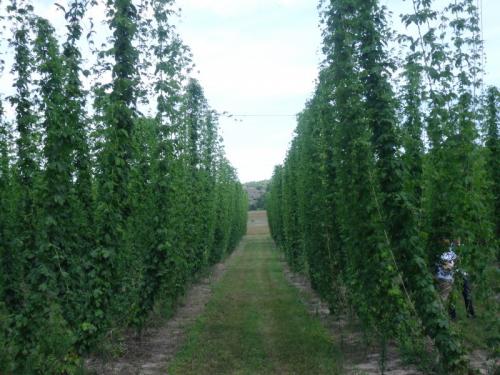High demand for Michigan craft beers creates demand for locally-grown hops
Increasingly, consumers are seeking locally-grown products. This also translates to the craft beverage industry where Michigan-grown ingredients, such as hops, are becoming a high-demand commodity.
Local food is in high demand. Chefs, restaurant diners, parents, school cooks, foodies and non-foodies alike are driving the local food trend. Farmers markets, grocery stores and large food retail chains stock local fruits, vegetables, meats and dairy products to meet this demand. But there’s another expanding market in Michigan that is sourcing grapes for wine, corn for distilled liquor and hops for beer.
The products that supply the Michigan craft-beverage industry are a small, but growing force in regional food systems. Demand for Michigan-grown hops is increasing with the rapid expansion of the craft brewing industry in Michigan.
According to the U.S. Department of Agriculture, “All beer contains two types of hops. The bittering hop is used to make brew more bitter. The aroma hop is used for flavoring. Hops grow on 20-foot-long vines and are related to cannabis. The female plant is the only one grown for beer production. From Michigan State University’s hops website, “Hops are an essential ingredient in beer production. The female flower "cones" of the hop plant contain lupulin glands with compounds important to the brewing process. These compounds—alpha acids, beta acids, and essential oils—contribute to beer’s bitterness and aroma. Recent hop shortages, the growing appeal of specialty beers, and the desire for organic and locally sourced agricultural products have resulted in increasing interest in local hop production among farmers, brewers, and hobbyists.”

Photo: Hops, a key ingredient in beer, are grown on 20-foot-long vines. Photo credit: J. Robert Sirrine
Consumer motivations for purchasing local products are varied. They may feel good about supporting a local farm or farmer. Some appreciate having a personal connection and understanding the farmer’s growing practices. Still others are attracted to the fact that locally-produced goods are fresher and spend less time being transported. Whatever the reason, these purchase motivations also carry forth to drinkers of Michigan craft-brewed beverages.
The Michigan Beer Guide reports in their November/December 2013 edition that there are 154 open breweries in Michigan and 138 have public hours. These are distributed across Michigan from Milan to Copper Harbor. An example of a Michigan brewery that uses locally-grown hops is Brewery Terra Firma in Traverse City, Mich. Terra Firma grows their own ingredients on site, whenever agriculturally feasible. Additionally, you can read more about a local hops harvest that supplies craft breweries in the Saranac, Mich. area at the Craft Beer Girl’s blog. Michigan State University Extension also provides educational programming for those interested in growing hops for production.



 Print
Print Email
Email




